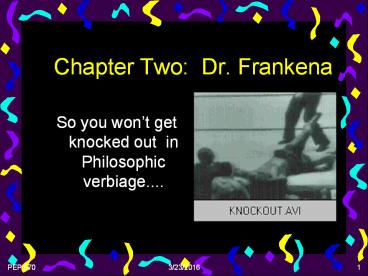Chapter Two: Dr. Frankena PowerPoint PPT Presentation
1 / 29
Title: Chapter Two: Dr. Frankena
1
Chapter Two Dr. Frankena
- So you wont get knocked out in Philosophic
verbiage....
2
What is Frankenas focus in his discussion of
chapter two?
3
Normative Ethics
- Which is what?
4
In our Mock Problems we have been practicing
casuistry...
5
a moralist trying to provide ethical guidance by
making a long list of specific situation,
describing them and telling us what we should do
in each case.
6
What is a teleological case?
- teleological theory says that the basic or
ultimate criterion or standard of what is morally
right, wrong, obligatory is the non moral value
that is brought into being? What does this mean?
7
What are nonmoral values?
- experiences, paintings, forms of government,
things, and what not.
8
We do not make moral decisions upon moral values
why?
- circular arguments....what are they?
9
What is a deontological argument?
- according to Frankena?
10
Contend that it is possible for an action or rule
of action to be the morally right or obligatory
one even if it does not promote the greatest
possible balance of good over evil for self,
society, or universe.
11
What is an act deontological theory?
- Different classes of deontic and teleological
theories...
12
Extreme act deontic - the golden mean is the
decision rests with the perception. No criterion
or guiding light.
- Frankena P. 16...situational ethics.
13
What is rule deontological theory?
- p. 17
14
The standard or right and wrong consists of one
or more rules. Basic rules independent of amount
of good derived.
15
What is an ethical egoist?
- does not refer to the Freudian concept,
necessarily but in the theoretical.
16
Ethical Egoist...
- one and only basic obligation is to promote the
greatest possible balance of good over evil for
self. He/she alone is the moral spectator,
advisor and judge. - in making second/third person judgments, go by
what is to ones own advantage.
17
Ethical egoists..hedonist
- Epicurean way of life...good or welfare
happiness and happiness with pleasure. Pleasure
may also be knowledge, poser, self realization,
life of pleasure, knowledge, and other good
things.
18
Everyone must act or judge by the standard of his
own advantage in terms of good and evil.
19
What is psychological egoism?
- What does Frankena say about it?
20
is not acceptable in any terms......
21
What is wrong with an act - deontological theory?
22
Errors....
- It is practically impossible to do in any
consistent or reliable fashion. - How often do we have time to think through the
problem? - We need rules to live by.
23
Rule Deontology
- An exception to a rule is no more than giving way
to another rule, the only problem is rank
ordering according to importance.
24
Explain W. D. Ross prima facie and actual duty
obligations.
25
Prima Facie/Actual Duty
- Prima Facie Duty - a set of rules that have no
exceptions, by conceiving of them as rules of
prima facie. - Actual Duty rules that occur in actual
situations. - Problem Can we set down all the rules.
26
What is Divine Command?
- How is it a rule deontological theory?
- How is it an ethical egoist theory?
27
Divine Command
- The rules are made by the divine will of God. It
is a rule deontological theory because the rules
are set by God and man is not to undo the rules. - It can be an ethical egoist rule because man does
so as God wills or man will suffer the
consequences.
28
What is Kants Categorical Imperative?
29
Kants Categorical Imperative
- Act only on that maxim which you can at the same
time will to be universal law. - acting voluntarily
- freely choose
- judging from the moral point of will to
universalize - action, right or wrong, if can be consistent in
similar circumstances.

